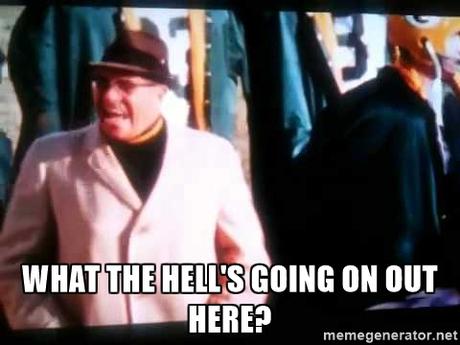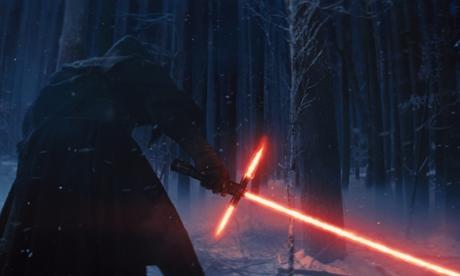
The question of whether or not there are too many movies in theaters this month certainly qualifies as a first-world problem of the highest degree. Nonetheless, it is a question worth pondering, especially after notable films (Live By Night, Silence) from two respected directors (Ben Affleck, Martin Scorsese) crashed and burned ( they both failed to even crack the top 10) this weekend in their wide expansions in an overcrowded January marketplace.
Seeking to explain these twin failures to The Hollywood Reporter, comScore box office analyst Paul Dergarabedian reasoned, "It may not be so much the fault of studios giving directors with well-earned clout the ability to exercise their creative power, despite obvious commercial limitations, but rather an overwhelming amount of filmed content that has diluted the marketplace pool to the point where unless you have the momentum of a La La Land, a Moonlight or a Manchester by the Sea, then you are just lost in the shuffle."
The true problem, though, started in December when Hollywood's traditional release strategy of dumping almost every major awards contender on us at the end of the year was even more backloaded than normal. According to Variety, there were 15 films released between Dec. 21-28, more than double the number from 2015. It wasn't just the final week of December, though. There were 44 new films across all of November and December, up from 34 in 2015. November and December's overcrowded release slate has inevitably spilled over into January, which will fit 17 new wide releases into its four weekends, five more than the last time January only had four weekends (2013) [See bullet points at bottom of article for the full run-down of releases].
Vince Lombardi, you want to take this one?

Thank you, Vince.
It's not like Hollywood doesn't already have enough competition as it is. Case in point: Instead of seeing Patriot's Day this weekend (which expanded wide for the first time, just like Silence and Live By Night) I stayed home during an ice storm and watched the stellar documentary Marathon: The Patriots Day Bombing on HBO Now, thinking it a suitable, more genuinely inspirational and far less self-aggrandizing depiction of the events than some Hollywoodized re-telling. Instead of finally seeing A Monster Calls I binged nearly all of Netflix's curios adaptation of Lemony Snicket's A Series of Unfortunate Events. And so on.
The reality is that for every new movie in theaters there's always four or five better/nearly as good movies or TV shows available to stream (and corresponding bloggers, friends, YouTubers spreading the good word of their beloved little movie/show no one knows about but everyone should). We are drowning in choices right now, and that's the challenge awaiting each new non-branded (not a sequel/remake/adaptation) movie, thrown not into the deep end but instead to the absolute bottom of the ocean and forced to desperately swim to the surface for air. La La Land and Hidden Figures, both currently soaring at the box office, clearly found air; Silence, Live By Night and A Monster Calls (which expanded wide last weekend) have not and probably won't.

So, what the hell is going on out here? Why is this year's January so overcrowded? What role does quality and critical word-of-mouth play in all of this, what with the polite, but not uniformly euphoric responses to Silence and Monster Calls and outright rejection of Live By Night? With such market saturation is it now just an extreme case of only the strongest and/or most marketable surviving, which certainly counts out Silence and it's near three-hour examination of faith in Jesuit priests in 17 th century Japan? Brilliant film, tough sell.
One theory: It's all The Force Awakens' fault.

The Hollywoood theatrical ecosystem is dependent upon historically reliable release windows (i.e., we get certain kinds of movies at specific times of the year), and while the Lord of the Rings and then Hobbit trilogies made hay in December into January it was not enough to upset the balance. Crowd-pleasing comedies and dramas as well as smaller awards contenders still rubbed shoulders together at the end of the year into the start of the next one. Things remained much as they'd always been, with the big Thanksgiving movies carrying over into December and then the big mid-December and Christmas movies carrying over into January while awards shows/nominations propped up the various Oscar hopefuls.
Then The Force Awakens grossed $247m in 3 days in mid-December 2015, instantly making it the 7 th highest grossing film of the year (it would, of course, go on to become the highest grossing film of the year by a ridiculously wide margin). No movie in history had even made $247m in the entirety of December, let alone in a mere 3 days. So much for historical reliability. Obviously, Rogue One, a prequel meant to hold us over until the proper Force Awakens sequel arrives at the end of 2017, wasn't going to make nearly as much money, but even doing half of that would still be record-setting for December. The other studios had to plan accordingly this year and ran away screaming from Star Wars' sudden Darth Vader-like grip around mid-December, shifting more films to the back of the month and over into January.

But it's not like Force Awakens destroyed everything in its path. Sisters, Tina Fey and Amy Poehler's $30m-budgeted comedy memorably sold on the tagline "You can see them both," opened opposite Force Awakens, and impressively legged it out after a meager $13m opening to a respectable $87m total domestic gross. Daddy's Home, The Revenant and The Big Short all thrived in Force Awakens' shadow. On the other hand, Joy and Hateful Eight disappointed compared to recent box office averages for those involved, and good luck getting anyone to see Room, Carol, The Danish Girl, Concussion, Anomalisa or Youth.

Jump to now and Rogue One is not the hit The Force Awakens was. It's made just under $500m domestic at this point in its run whereas Force Awakens had crossed $850m at the same point in its release cycle. Still, you know what other movie made more than $500m in the last calender year? Nothing. The next closest is Finding Dory with its $486m. So, Rogue One is plenty big enough to be considered a box office disruptor right now.
However, it's a bit too simplistic to lay this at the feet of Force Awakens, angrily shake our fists in the air as we shout, "What hath though wrought, all mighty J.J.?" This is an industry-wide problem. For example, when it became apparent Live By Night was not a true awards contender where else should WB have put it? February? What, and put current Batman up against animated Batman in The Lego Batman Movie or contend with John Wick 2 and Matt Damon's big budget China co-production The Great Wall? Don't even bother with looking at March, not with Logan out one week, Kong: Skull Island the next, Beauty and Beast after that and Power Rangers and Ghost in the Shell after that. April already has 13 wide new releases, and can you really find a hole somewhere in-between all the comic book movies in the summer?

After that, you've already been sitting on the movie for nearly a year, likely upsetting Affleck in the process (and we already know what he looks like when he's said thanks to the above meme) and signaling your lack of faith to the marketplace. That lack of faith might be well-founded, but it's also born out of the increasing truth that there just aren't as many pockets for smaller or mid-budget movies as there used to be thanks to the year-round scheduling of what used to primarily be summer blockbusters.
Potential solution? Maybe it's finally time to stop backloading so many awards contenders at the end of the year. If the blockbusters are taking over everywhere audience fatigue will inevitably kick in (or so we keep telling ourselves) thus theoretically creating a market for more serious-minded alternatives. As Variety somewhat similarly argued:
Clearly, awards season is imbalanced. It's OK that there are more films; and it's OK that they are seeking awards attention. The problem is that too many movies are following the exact same awards timetable. The year-end logjam is not helping those films, it's not helping voters and it's certainly not helping audiences (and most of these Oscar hopefuls are targeting the exact same viewers).
On Jan. 20, 1997, Variety ran a story saying distributors were optimistic about "transforming the movie industry into a year-round business." For many decades, May was considered a dead month for movies and the 1996 launch of "Twister" that month was considered radical. Since then, the definition of summer has expanded. Awards season needs a similar rethink.
Or, more realistically, things will stay the same, frequent moviegoers like myself who make up half of all moviegoers will still trek it to smaller movies and awards contenders whenever we can, most everyone else will grow to only see theaters as a venue to see big budget action movies and cartoons (which, nothing against them, since such films nearly made up half of my top 10 of 2016) and the best stuff will keep going to Netflix, Amazon and elsewhere as the great brain drain of directors, writers and producers away from film and over to streaming will continue.
Or this has simply been an especially strange couple of weeks for new movies and next year will be better in terms of spaced out releases and my doomsday prophesizing above will seem even more laughably reactionary a year from now.
The Wide Releases of Recent Januaries January 2017- 11 Wide releases (Underworld: Blood Wars, Bye Bye Man, Sleepless, Monster Trucks, The Founder, The Resurrection of Gavin Stone, Split, xXx: The Return of Xander Cage, A Dog's Purpose, Gold, Resident Evil: The Final Chapter)
- 6 December awards-qualifying releases receiving wide expansion (Hidden Figures, A Monster Calls, Live By Night, Silence, Patriot's Day, 20th Century Women)
Result: 17 total new wide releases in the month (4 weekends)
January 2016- 10 Wide releases (The Forest, Ride Along 2, Norm of the North, 13 Hours, Dirty Grandpa, The Fifth Wave, The Boy, Kung Fu Panda 3, Forty Shades of Black, The Finest Hours)
- 4 December awards-qualifying releases receiving wide expansion (The Hateful Eight, The Revenant, Spotlight, Carol)
- 2 November-released awards contenders finally expanding wide (Room, The Danish Girl)
Result: 16 total new wide releases in the month (5 weekends)
January 2015- 11 Wide releases (The Woman in Black 2, Taken 3,The Wedding Ringer, Paddington, Blackhat, The Boy Next Door, Strange Magic, Mortdecai, Project Almanac, Black or White, The Loft)
- 4 December awards-qualifying releases receiving wide expansion (Selma, American Sniper, Foxcatcher, A Most Violent Year)
Result: 15 total new wide releases in the month (5 weekends)
January 2014- 9Wide releases (Paranormal Activity: The Marked Ones, The Legend of Hercules, Ride Along, The Nut Job, Jack Ryan: Shadow Recruit, Devil's Due, I, Frankenstein, That Awkward Moment, Labor Day)
- 4 December awards-qualifying releases receiving wide expansion (Lone Survivor, August: Osage County, Her, Inside Llewyn Davis)
- 1 November-released awards contender finally expanding wide (Nebraska)
Result: 14 total new wide releases in the month (5 weekends)
January 2013- 9 Wide releases (Texas Chainsaw 3D, A Haunted House, Gangster Squad, Mama, Broken City, The Last Stand, Hansel & Gretel, Movie 43, Parker)
- 3 December awards-qualifying releases receiving wide expansion (Promised Land, Zero Dark Thirty, The Impossible)
Result: 12 total new wide releases in the month (4 weekends)
Source: THR, All release information comes from BoxOfficeMojo, Variety

